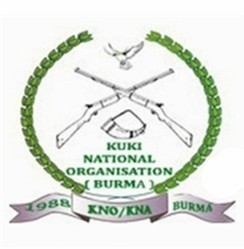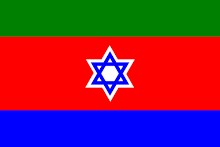
Army wing: Kuki National Army (Burma) |
 |
|
SUMMARYHeadquarters: Mobile Headquarters Operational Area: The land strips of Burma’s townships (sub-division or districts) located along the border with India such as Tonjang township, Tamu township, Myothit township , Homalin township, Laysi township and Khamti township. Estimated Strength: 200+ Leader: Pu. Letlam Cabinet member:
|
Peace ProcessNon-ceasefire # clashes – Official delegation teamNon Liaison officesNon |
Brief history:
The Kuki National Organisation/ Kuki National Army (KNO/KNA) was founded on February 24, 1988 with the sole aim of realizing the Kuki Peoples’ lost rights, i.e. the security of our lives, dignity as an ethnic nationality, socio-economics, politics security, etc. by getting the land, where our forefathers had lived independently and died with dignity, accorded as “self-administered state”.
Since our people and land have been torn apart by the creation of two nations namely India and Burma after the colonial British had granted them independence in the late forties, our people divided by the international boundary of these two independent nations now fights respectively for recognition in the form of Federal State Unit in the territory they are circumscribed.
Right from its formation, the KNO/KNA, having aims and objectives of establishing Kuki states, as stated above, in two independent nations – India and Burma, the administration and the personnel of two organizations with a single name was therefore officially bifurcated and separated after over two decades of operation. Consequently, the name KNO/KNA (Burma) was coined and is constituted by the Kukis whose territory is encircled by the present day map of Burma while the other wing, i.e. KNO/KNA by default means one that fights for recognition in India.
It may be clarified that bifurcation of the KNO/KNA was preceded by a number of political events which finally led to such decision. Under pressure from the Kuki people after 2010 military led general election in Burma, KNO/KNA(B), the Kuki Students’ Democratic Front (KSDF), the Kuki Peoples’ Congress (KPC) and the Kuki Women’s Human Rights’ Organisation (KWHRO) along with leaders of the community based organizations abroad and inside Burma held a number of consultative meetings which finally decided that, the wing of KNO/KNA which operates in Burma should henceforth be separated from KNO/KNA or KNO/KNA (India) and be named KNO/KNA(B) which should be authorized to frame policies for all political matters of the Kuki people of Burma.
This decision was intimated to the president of KNO/KNA (India) and accordingly a formal meeting for demerger/bifurcation process was held during July 27th to 28th, 2013 which concluded with the agreement signed by leaders from both the bifurcated organizations.
The KNO/KNA (B) operates actively in the Kuki peoples’ ancestral land which includes the present day Burma’s townships (sub-division or districts) that spread along the border with India such as Tonjang township, Tamu township, Myothit township, Homalin township, Laysi township and Khamti township.
Since 1988 till 2013, there were about twenty arm confrontations with the army of Burma in our operational area and in the stand-off during this period, the KNO/KNA (B) lost three comrades but able to obtained/recovered over fifty weapons or guns from Burma’s army who also lost nine personnel and one officer in our hand.
Thus, in the consultative meeting held with the Burmese Kuki organizations during 29th to 30th July, 2013, KNO/KNA (B) pledged to revive the ethnic Kuki peoples’ lost dignity, socio-economic and political status by getting the Kuki people and their ancestral land accorded ‘a separate federal state unit’ under the Union of Burma by the concerned authority.
Aims and Objectives:
KNO/KNA(B)’s Political Stand:
- To ensure every Kuki man or women enjoys the fundamental and inalienable rights articulated by the Universal Declarations of Human rights and the International Covenant on Civil and Political Rights.
- To re-establish the Kuki peoples’ lost dignity by integrating the Kuki peoples’ ancestral land and getting it accorded as a self-administered state unit under the Federal Union of Burma.
- To fight against the common enemy of military regime until it is totally uprooted from Burma.
- To work for establishment of a genuine Federal Union of Burma, where every indigenous and ethnic nationality, including the Kukis, has security and equal enjoyment of the first, second and third generation rights.
- To grant citizenship to all the victims and their descendants of Khadawmi Operation, 1967 in which over 20,000 Kukis have been unjustly dislocated from their homesteads into refugees.
KNO/KNA(B)’s stand on the Kuki Nation
- To protect the collective rights and dignity of the Kuki peoples of Burma, which posses all the characteristics of a distinct ethnic group.
- To preserve and promote the literature, tradition, custom & culture of the Kuki people.
- To promote and propagate patriotism, love and unity among the Kuki people.
- To work for the welfare of the Kuki peoples’ healthcare, education, economy and living standard.
Meetings
| # | Date | Location | KNO/KNA Rep | Govt Rep | Details |
| 1 | |||||
| 2 | |||||
| 3 | |||||
| 4 | |||||
| 5 |
Developments
Statements
Oct 21, 2013 – http://issuu.com/knoknaburma/docs/to._the_myanma _peace_center
May 20, 2006 – http://issuu.com/knoknaburma/docs/kno__burma__statement_for_kuki_risi
http://issuu.com/knoknaburma/docs/kno_kna__burma
Reference: Deciphering Myanmar’s Peace Process – A Reference Guide (2021 – 2022)
